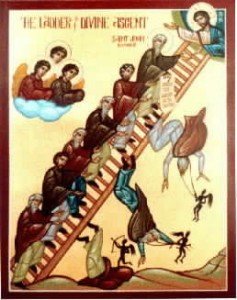 The ninth step on John’s Ladder, that is Remembrance of Wrongs, is one that truly elicits many comments. It seems that the natural tendency in humans is to remember wrongs, whether real or perceived. The greatest cure for the sickness that is the remembrance of wrongs is the remembrance of what Christ endured for sinners, ourselves included. When we contemplate God – the only Good One, the only Holy One, the Almighty Who created all things – suffering on the Cross in love and humility and saying, Father forgive them for they do not know what they do, how can we continue to bear a grudge? But all too often, we seek to justify our anger. People often say, but this person knows what he does! Do you think that makes any difference? If the Pharisees, many of whom did know better, had repented and asked Christ to forgive them from the foot of the Cross, would our Lord have refused?
The ninth step on John’s Ladder, that is Remembrance of Wrongs, is one that truly elicits many comments. It seems that the natural tendency in humans is to remember wrongs, whether real or perceived. The greatest cure for the sickness that is the remembrance of wrongs is the remembrance of what Christ endured for sinners, ourselves included. When we contemplate God – the only Good One, the only Holy One, the Almighty Who created all things – suffering on the Cross in love and humility and saying, Father forgive them for they do not know what they do, how can we continue to bear a grudge? But all too often, we seek to justify our anger. People often say, but this person knows what he does! Do you think that makes any difference? If the Pharisees, many of whom did know better, had repented and asked Christ to forgive them from the foot of the Cross, would our Lord have refused?
Devout Christians will often use the Scriptures, the Church Fathers, and examples from the lives of the saints to make their unhealed passion appear to be righteousness. Indeed, malice is an exponent of Scripture which twists the words of the Spirit to suit itself. Such self-justification puts an end to repentance and makes all our human passions incurable. Indeed, God‘s forgiveness knows no bounds, and so, if we truly want to be worthy of the name ”Christian,” we must strive to forgive with the same boundless forgiveness, that is to forgive not “up to seven times, but up to seventy times seven.
Forgiveness is both the response of God’s love and, at the same time, the ultimate precondition for receiving God’s forgiveness for our own sins. John says: Forgive quickly and you will be abundantly forgiven. To forget wrongs is to prove oneself truly repentant.
Think about this!
